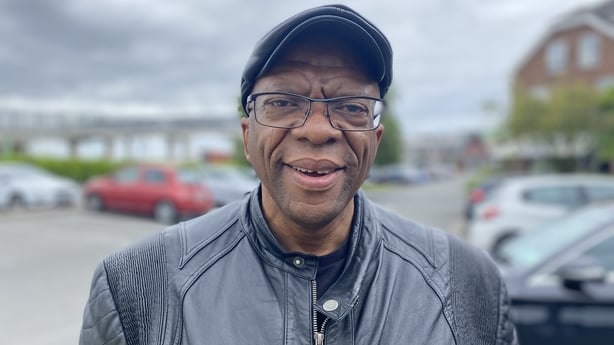Some newly arrived asylum seekers have spent a number of nights sleeping rough, after they were told there was nowhere for them to stay.
The Department for Children, Equality, Disability, Integration and Youth has confirmed that since last Thursday around 130 newly arrived asylum seekers could not be offered accommodation due to the current shortage.
The Irish Refugee Council said this as "unprecedented" and "represents a real break down and a failure in response to people seeking asylum here".
The Minister Roderic O'Gorman said the Sport Ireland Campus at Abbotstown in Dublin would be opened to accommodate international protection applicants in the next 24 to 48 hours.
By lunchtime this afternoon there was at least 15 international protection applicants waiting in the reception of the Irish Refugee Council, looking for help after spending at least one night sleeping rough.
"We have not experienced anything like this before," CEO of the Irish Refugee Council Nick Henderson said.
"The standards in direct provision and emergency accommodation have been plummeting for several months now, but this represents a new deterioration and it means that someone coming here from war or persecution, coming to Ireland for sanctuary, is in effect street homeless," Mr Henderson said.

Lucky Khambule, co-founder of the Movement of Asylum Seekers in Ireland (MASI), said he began receiving calls from recently arrived international protection applicants "crying out for help" last night.
"It was late already and we tried to look for hostels around but all the hostels were booked. We were prepared to pay for them to have at least a night asleep somewhere, but that was not possible," Mr Khambule said.
Mr Khambule said that the Government is "failing people seeking international protection" and is not meeting its "obligation to treat people who seek international protection with dignity and respect".
Under the Reception Conditions Directive, where the "accommodation capacity normally available is temporarily exhausted" the Minister can provide temporary alternatives that "meet the recipient's basic needs".
However the Irish Refugee Council and MASI said that the international protection applicants have been left without any alternative accommodation, and the State is failing to meet their basic needs.
RTÉ News spoke to two international protection applicants who said that they were told there was no accommodation available to them.
Both have spent a number of nights rough sleeping. One said that he did not feel safe safe.
"Where we sleep outside there is nothing, (no) blankets, we're just standing and sometimes we try to sit down, it's just like that."
"You feel like you are not safe, you feel shame, everybody looking at you when you are sleeping, asking what happened to this guy, why is he sleeping outside."
Both men had contacted the Irish Refugee Council looking for help.
Asked where he would sleep tonight, the second man replied: "I don't know, I am just hoping we will be assisted here but if they can't assist there is no choice we just go back on the streets."
The Department for Children, Equality, Disability, Integration and Youth said it is currently providing accommodation for over 52,000 people, 37,500 people who have fled the war in Ukraine and some 15,000 International Protection applicants currently requiring accommodation.
Mr O'Gorman said that it was in the context of this "sustained pressure on accommodation" last Thursday that the available stock of accommodation for international protection applicants "reached capacity".
"At that point we were only in a position to offer accommodation to international protection applicants with a vulnerability, women, children and those with a disability."
"It is not acceptable that people aren't accommodated and that's why we are doing everything we can to resume the ability to be able to offer accommodation to absolutely everyone seeking international protection here in Ireland," said Mr O'Gorman.
Prior to this, the ongoing shortage of acclamation has seen Ukrainian refugees and international protection applicants temporarily being accommodated at Dublin Airport this summer, people sleeping on chairs and on floors at the transit hub in Citywest, Ukrainian refugees being temporarily accommodated in tents at Gormanston Camp in Co Meath, and the current construction of tented accommodation on the grounds of State-owned Direct Provision centres in Clare, Westmeath and Kerry.
"It continues to be really challenging to secure additional accommodation for international protection applicants, even more so than accommodation for Ukrainian displaced persons," Mr O'Gorman said.
"My officials are following up any lead in terms of the offer of additional accommodation and there are a number of sites and a number of offers that we are looking at over the next number of weeks, which will again provide international protection accommodation capacity," Mr O'Gorman added.
The Irish Refugee Council has been attempting to find accommodation for those who came to its offices today seeking shelter.
It contacted the Dublin Homeless Executive but Mr Henderson said it was informed by Dublin City Council that "they cannot assist and to refer people back to IPAS (the International Protection Accommodation Service)."
Dublin City Council confirmed to RTÉ News that "asylum seekers are accommodated by IPAS, funded by the Department of Children, Equality, Disability, Integration and Youth Affairs. Local Authorities have no role at present in housing asylum seekers until they have residency status."
Mr Henderson said that the Irish Refugee Council is "trying to arrange accommodation for the group for one night using its emergency homeless fund which is now near exhaustion due to increased demand in recent weeks."






